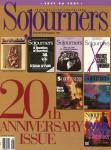This, be it said for a start, is in the nature of a love letter. I understand the term in a pristine, maybe an arbitrary, sense. A summoning from oases of memory of the heartfelt, all but inarticulate feeling that governs life at its fullest. And by the same token governs occasions, like the Sojourners anniversary, that defy the verbal.
Gratitude is the point of this; I want simply to say my thank you.
So these words have no practical bearing. No suggestions that will tend to the improvement of the pages of Sojourners -- let alone erase the Washington slums, chasten or convert George Bush, bring healing of community to our (normally) fractured lives, quell the appetite of multicorporate hydras.
My words, in fact and intent, are useless as a simple thank you. In this they may resemble love itself, which is notoriously inefficient, and which, in someone's phrase, refuses to "wallow in the sensual sty of utility."
Being useless, my words may from afar even be thought to resemble the word of God -- a being who, we are told, sets small store on the "useful" categories and obsessions of Americans or others. Writing you, thinking of you, I summon to mind something other than the mere usefulness with which God is usually credited and, at the same time, unutterably debased.
God useful to us, at the service of our appetites, our unutterable violence? To be summoned out of his (sic) heaven (sic) by the heady clamor of church bells, in celebration of mass murder?
We do not deserve a better God than the times, which are "evil," provide. God help us; God forgive us our vile gods.
Before the true God, we are bones, dry bones. The sole saving truth, our only hope, is that there exists a better God than our gods, a being who in no sense must wait on our deserving -- or rejoice in our crimes.
A God who would be, if permitted place, someone other than a bottled genie to be decanted, sword ready, on command.
A friend, even as you and I. A friend who creates friendship, even amid the icy and fiery geography of our despair. Even among a hostile and alienated and belligerent people -- ourselves.
A friend who against all odds (and how skilled we are in upping the odds!) makes of the incompatible something new, something surprising; whether these be thought of as woman and man, Gentile and Jew, American and Iraqi, God and our (usually awful) selves.
Thank you for a glimpse, and how much more, of that friendship.
Daniel Berrigan, SJ, a Sojourners contributing editor, was a priest, poet, peace activist, and the author of Whereon to Stand: The Acts of the Apostles and Ourselves (Fortkamp Publishing, 1991) when this article appeared.

Got something to say about what you're reading? We value your feedback!
